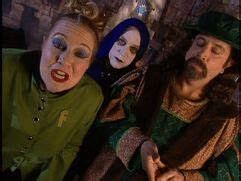Re-reading Shakespeare’s The Winter’s Tale. We’re in act 2 now, with a trial (of sorts) an arrest, and what may or may not be fantasy magic.
This scene begins with young prince Mamillus and some ladies of the court fawning over him. Remember the opening of the play, where Mamillus was described as something of a golden child, beloved throughout Sicilia. They play a weird game where he guesses the colors of their eyebrows. I suppose their brows are either covered up, or the ladies are standing behind him. There’s some talk about the ladies’ eyebrows and noses being “blue,” perhaps in reference to the cold of winer. I see that this can be played as either adult women playing a game with a cute child, or if Mamillus is more in his early teens, maybe the girls could be his own age as this could be flirtation.
Hermoine interrupts their game to spend time with her son. She’s described as being in good spirits. So either her romance with Polixenes is genuine, or she’s simply naïve and unaware of what’s about to happen to her. She asks Mamillus to tell her a story, and he says he’ll tell her a story about winter, about sprites and goblins. It’s more fantasy imagery for this high fantasy story. In this mythology, or at least in Mamillus’ imagination, sprites and goblins only come out in winter. We’re not privy to any more of Mamillus’ story, but could this be the actual winter’s tale of the play’s title? One could make that case.
Leontes enters, accompanied by the courtier Antigonus and a bunch of nameless lords. Antigonus is going to hang out on stage and not say anything until the end of this scene, but he’s a very important character, because he’s the one who will… exit, pursued by a bear!!! It’s up to the staging, the costuming, and how the actor presents himself to let the audience know that this character is someone important.
Leontes reacts to news that Polixenes and Camillo have fled Sicilia. He gives a great speech about drinking from a cup poisoned by a spider, but immune to the poison because he witnessed the spider. This is all to illustrate how certain he is in Hermoine’s cheating on him with Polixenes, despite any evidence. Again, I reminded of Dungeons and Dragons, where players might roll some kind of ability check to determine whether a cup is poisoned before they drink from it.
Leontes sends Mamillus and ladies out of the room, leaving Hermoine surrounded by all the men (uh-oh). The scene takes on the feeling of a trial. Leontes accused her of adultery, and she in turn calls him a villain. They go back and forth in their arguments for a bit, until Leontes proclaims “Away with her to prison.” Hermoine speaks to the lords, with more semi-fantasy imagery about an “ill planet” reigning over her, and her belief that “the heavens” will someday be more favorable to her. (Also some foreshadowing here.) She tells the lords that she is not prone to crying as other women are, but her grief is as great as tears. She demands that her serving women go with her.
Antigonus and one of the lords appeal to Leontes to listen to reason. Antigonus speaks about his love for his wife and children, and how he wouldn’t want them broken apart. Now that we know Antigonus is a good guy, it makes his actions in upcoming scenes make more sense, and it makes his bear-y fate even more sad. Antigonus and the lord continue to argue that Leontes has no evidence of Hermoine’s crime, while Leontes again asserts that he can see what others can’t.
Then Leontes assures Antigonus that he’s sent two of his men, Cleomenes and Dion, ahead to consult with the Oracle of Delphos at Apollo’s temple. Everyone believes the oracle will speak the truth of the matter. This is more fantasy magic in the play (or, perhaps, misguided belief). This is a reference to Pythia, commonly known as the Oracle of Delphi. If you google “Oracle of Delphi” you can see this is A LOT. I’ll get to the further details in a future scene.
How to portray this on stage to get the idea across? Although Leontes speaks about sending Cleomenes and Dion away in the past tense, it would be easy enough to have them be two of the lords in this scene, and have them go on their way right there. In a filmed version, maybe this dialogue could be moved to a high balcony overlooking the city, and Leontes can point out to figures in the distance as they leave the city on their way to the Oracle. A film could occasionally cut away to shots of Cleomenes and Dion on their journey, like how Kenneth Branaugh’s Hamlet occasionally cuts to Fortinbras’ army on the move throughout the movie, making him an omnipresent force during all of Hamlet’s wishy-washiness.
Next: Be my, be my baby.
* * * *
Want more? Check out my ongoing serial, THE SUBTERKNIGHTS, on Kindle Vella. A man searches for his missing sister in a sprawling city full of far-out tech, strange creatures, and secret magic. It’s a sci-fi/fantasy hybrid full of action, romance, mystery, and laughs. The first ten episodes are FREE! Click here for a list of all my books and serials.










